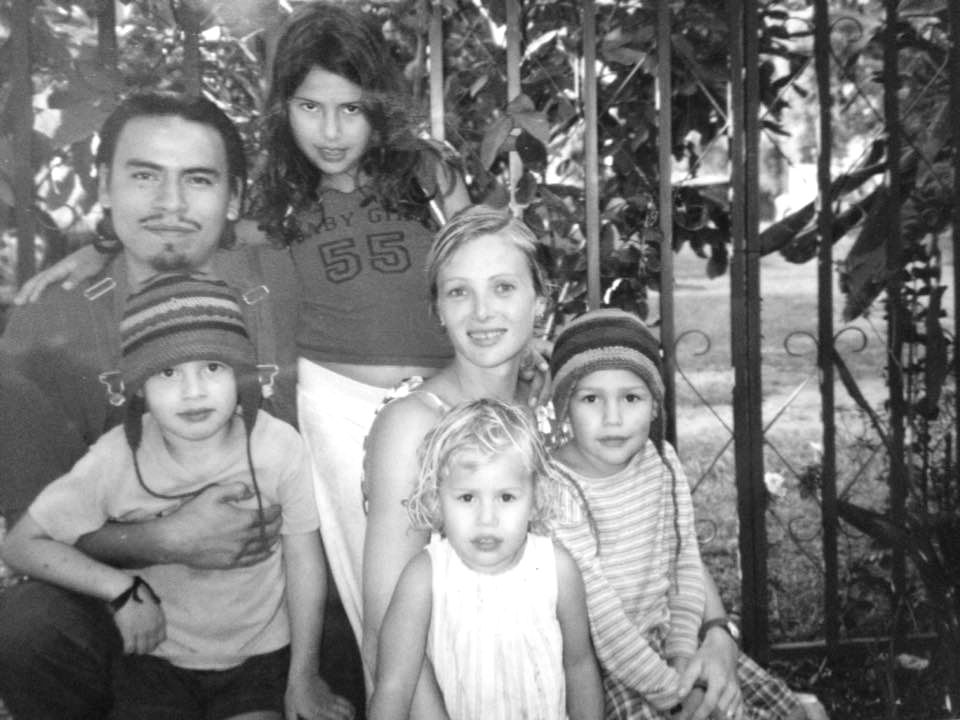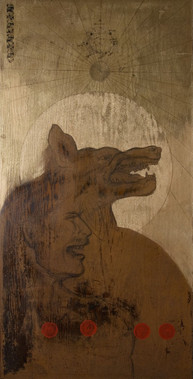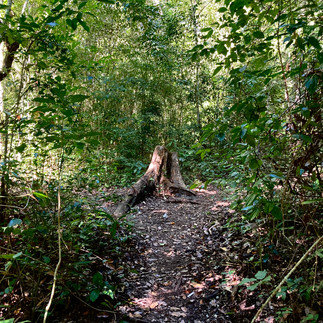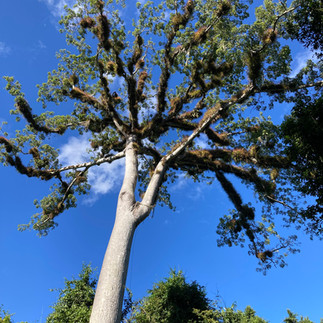Living among the Mayan Q 'eqchi
- Emily Elizabeth Hassell
- Aug 29, 2024
- 8 min read
Updated: 7 days ago
Special Edition

Sal Scarpetta, Italy
Native
Hello dear ones,
On a more personal note, Ive been thinking a lot recently about the word Native. Whether it is because my great great grandmother was Native First Nation, or whether it was growing up going to the anual Gallardo Family Solstice gathering listening to the mesmerizing haunting Andes Manta pan pipes wooing both the heart and the soul as they danced around a great fire. Or if it was from taking a course with Ricardo Sierra who was second hand man to the mega man tracker Tom Brown and taught us how to sit quietly and to camouflage ourselves into the woods. Somewhere along the way in my childhood a profound love for 'that which is native' set in. Not so much in the spiritual sense, but rather a great admiration, regard, and repect of nature as a whole.
I feel incredibly grateful to have been able to grow up surrounded by nature as my backyard, on the farm, organic agriculture, riding horses, skiing beautiful snow coved mountains in the winters, swimming in fresh water streams, running barefoot in valleys, hills, and summertime fields.
I had supportive parents, I liked working, and I left school after 10th grade to volunteer for two years at Camphill in England. I did the Foundation Year in Curative Education at Camphill, worked as a therapeutic riding instructor, did theatre, got to experience my first real working pottery studio, and aquired my Certified Nurses Aide for Elder Care yaddah yaddah.
The point is by 18 I had already been out of the house "on my own" for two years before taking up the invitation from my eldest brother to drive down by land from Canada to Guatemala for the first time in 1994. It was two years before the signing of the Peace at the end of the 30 year civil war. Bridges were still being blown up, pollice controls everywhere, the infamous white UN Convoy SUV's were a regular sight, and Guerilleros were known to to still be in hiding in the hills.
I wanted to learn spanish and I intentionally integrated myself from the get go with a local crew of people my age, going from an outsider to an insider in a matter of a few days. I fell in love with the country and married a man, father to all four of my children, who are part Mayan and Guatemalan born.

Just shortly before moving to NY for ten years in 2006 papa Josue, Alexandra, Yakko, me, Eliaz, and Giovanna.
Throughout all my years in Guatemala I have met a very few lifelong forigner friends, that I met only because they happened to come into the same circles that I have been in. That said, all of my friends are Guatemalan, and wherever I have lived here, I have more often than not, been quite contentedly the only white person who I really know.
I have to thank my friend Victor for inviting me to come up to Peten to take care of his private lakefront property for the first five months I was here. Taking the dogs out for daily walks at his place the options were either along the busy main road down and back again, or nice long loop through the enchanting little farming village right across the road.
But I have the dogs to thank for introducing me to everybody. As per dogs do, they wanted to stop to greet all the other dogs at everyones' front gate. The respective owners always came out to chit chat, and thus in this unanimous manner all my introductions to my new neighbours began.
I had already gained a thorough appreciation for the sheer abundance of the natural world here. I have mentioned it before, but there is such a strong, powerful sense of the primordial here, like Eden, balmy warm, with a massive amount of exquisitely beautiful elemental life. But I didn't know the inside scoop.
I started hearing peoples stories and being invited into peoples homes. I started seeing and understanding the true situation, the hardships, the challenges, and the difficulties. I also started asking a lot of questions and doing a lot of initial research. Living with no access to resources, failed government systems, little basic infrastructure, I found myself to be a sole witness in the middle of what is considered a social, environmental, and ’a human rights disaster’. But at the same time, I could also see clearly the villages incredible potential with many feasible solutions. On a professional level I decided to expand and commit my non for profit to work with them, and on a personal level to be and stay with them in the village, as my new home.
Normally someone “like me” would usually be, or have a house with the more fancy folk on the lakefront. So as my friend Irene said pointed out the by saying in an introduction the other day “She’s working with a local Campesinos Association in San Pedro, but she lives in the part up top, with the Q’eqchi”.
As people who rely on nature, as an agrarian village with free range domestic farm animals of every kind running around everywhere, as a cowboy village with horses everywhere, I feel at home. I fit right in here out in the country, in my dirty gardening and clay covered jeans.

When I first arrived, there were things about "the way things work" here that were simply beyond my comprehension. Don't get me wrong, I speak Spanish fluently, Ive lived in this country many, many years, however I absolutely did not understand the Cultural Language! It felt like a different country, a Guatemala I had never encountered before. I didn't have clue how to “deal with it” being such a task oriented, practically minded, a-b person. I mean I do visit socially sometimes, sure, but for the better part of my life Ive been a little work horse on the go.
The thing is the social aspect of life here is the priority in every single interaction. You've just gotta stand for however long for someone to finish up a conversation, whenever they are done. The moment you walk in anywhere in our village, the first thing everyone does is pull up a chair for you to sit down and stay a while. Frequently within moments a plate of food or a drink is handed to you. Sharing a fresh corn tamale- from their field that is two hours walk away, that has taken a day to make, that’s been wrapped in corn husk, that’s been cooked over a wood fire with wood they took hours to cut, collect, and carry home for miles on their very own backs.
And while as a chair is being pulled up, Ive mostly gotten in the habit of apologetically saying "Oh Gracias! But Im just passing by", trying to avoid throwing my mornings plans out the window by being there for a whole half hour or more that I hadn't planned on. But more so, I am also trying to avoid the moment in which Im terribly ashamed that someone with so exceedingly little, is highly likely about to give me something from their hearth and home that took them an incomprehensible huge amount of time and labor to make.
As someone with “solemnly more", I have been confronted and forced to recon with the fact of how insignificant my "more" is. Compared to the exquisite wealth in the very natural gesture of sharing that they make, my “more” is nothing. It means nothing. As they say "here" with extended hands, having wrapped up the tamale for me to take home because Im not sitting down to stay. And it's not because it's me. It makes no difference who it is. It's just a part of the cultural norm, and would happen regardless be I were Emily, Maria, or Juan. Every time it is simultaneously both a gut wrenching and humbling moment that I have learned to accept with profound humility, gratitude, and grace- as they show me up and open my heart, time and time again, to how it is to respectfully truly share, and give, and receive.
And yes, I do accept and sit down at times out of deepest respect, regard, and gratitude- for giving me the honor and allowing me to be a part of their lives.
These folks have taught me more in a year than I have ever taught anyone in my lifetime! Where many men walk two hours to go to work in the fields, and another two home. Where there are few machines, and almost everything is done by hand. Living a life where nature is the primarily resource and source of living itself. What they know how to make, to cook, to build… They have been teaching me- how to handle and use the natural resources that are here. The names of wild animals, the plants, dirt, rocks, and trees. They call themselves “ low resource” which is true, but what they have here is absolutely overflowing with potential, exceedingly important, and rich. With just a slight shift in mentality we can lead our village away from poverty down a path to abundant wealth.
Series by yours truly from "Tides" Basilica Industria 2008
Before leaving Antigua, I had been craving to get back closer to nature and lived for the last few years right outside the city limits, just a short walk to all my wonderfully official and dress jacket worthy meetings.
Ive done big cities, Ive done bohemian, Ive done fancy, but as you know now, Im a country girl at heart. For some time I had been wanting to live more in alignment with lowering my own personal footprint on the earth. To tread more lightly, to move closer to the frontlines, to get engaged in environemental work, to leave leave the most important inheritance for my children, which is the one and only earth. In looking at Guatemala, in pinpointing my current location, smack in the middle of an at risk Global Hotspot for biodiversity, on the edge of the Mayan Biosphere, near Tikal, on the edge of Lake Peten Itza- This is it!
"Hotspots are among the richest and most important ecosystems in the world — and they are home to many vulnerable populations who are directly dependent on nature to survive. By one estimate, despite comprising 2.5% of Earth’s land surface, the forests, wetlands and other ecosystems in hotspots account for 35% of the “ecosystem services” that vulnerable human populations depend on." Conservation.org

We need your help to Conserve this critical Cultural Landscape!
You can see the protected Biosphere border defined dark green up top /to the left. You can see compared to it, how much of our unprotected Buffer Zone is already gone!
We can stop it, we can turn it around! It's not too late! Nature is incredibly resilient, especially here in tropics, recovery time here is double as quick! You've seen the amazing valleys around the world that have been replanted from desert, from nothing. We are already in a better position than most of them.
As one of the world's largest tropical rainforest regions in Mesoamerica, second to the Amazon, as a nature dependent people, all of our families futures here rely on this.
It's not just important to us, it is important for the future survival of the natural, cultural,
heritage of the entire earth!

I want to thank you all for joining me on this incredible journey. Please help if you can by making a donation today!























Comments